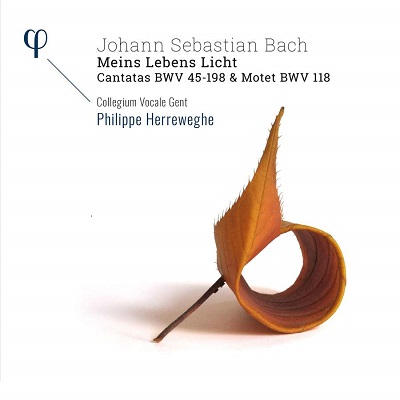Every freshly minted disc from Philippe Herreweghe’s Collegium Vocale Gent prompts a rapturous fanfare. We take for granted the quality of each recording venture from this 74-year-old Belgian, but how many performances of Bach’s Cantatas do we need from him, or from other baroque specialists? Reputation goes a long way in deciding this and with nearly fifty years recording experience Herreweghe’s status is unassailable. But it’s not all about the quality of direction, sensitivity of ensemble playing or the calibre and musicianship of soloists. A recording has to capture some magic. In this regard, this latest issue from PHI (the label he founded in 2010) mostly succeeds.
The disc comprises three works associated with Bach’s Leipzig years with the short funeral motet O Jesu Christ, meins Lebens Licht BWV118, placed between the cantatas Es ist dir gesagt, Mensch, was gut ist BWV45 (written for the Eighth Sunday after Trinity and a meditation on Christ’s ordeals) and Laß, Fürstin, laß noch einen Strahl BWV198, commonly known as the Trauerode (Funeral Ode). In its combination of sacred and secular, the disc reminds us of Bach’s employment as Thomaskantor and his unofficial position as Leipzig’s Director of Music.

It’s fair to add that the 1727 Trauerode – privately commissioned by a wealthy Leipzig student Hans Carl von Kirchbach to commemorate the death of the much-loved Electress of Saxony, Christiane Eberhardine and titular Queen of Poland – inspires its composer to create one of his most imaginatively conceived and colourfully scored cantatas. That’s not to suggest that BWV45, written as part of a conveyer belt of weekly duties for St Thomas’s Church, is without interest, although it’s not in the same league as the pièce d’occasion that is BWV198. Indeed, Bach was sufficiently impressed with his own work that its choruses and arias provided him with the scaffolding for his St Mark Passion, of which only the text has survived.
Performances from Herreweghe and his soloists are mostly satisfying. But it’s a shame that we only hear German soprano Dorothee Mields in the Trauerode where her exquisite singing demands attention in an ardent recitative, a breathless display of emotion expressing grief for the death of the Electress. Her subsequent aria, ‘Verstummt, verstummt, ihr holden Saiten!’ with consoling strings, is no less heartfelt in its fervent pleas where Mields brilliantly conveys comfort for the distressed.
British countertenor Alex Potter is a more variable soloist, sounding hooty and somewhat perfunctory in the richly scored ‘tolling bell’ recitative from BWV198. Despite the ominous tread of the continuo group with two lute parts, its sense of dread never quite evokes troubled souls. ‘Wie starb die Heldin so vergnügt’ (wrongly attributed in the booklet as the soprano’s aria two tracks earlier but with the correct translation), with its ear-catching lute and plangent viola da gamba contribution, is a more convincing affair, Potter now eloquently caressing its soothing phrases. There’s a similar intimacy in his aria, ‘Wer Gott bekennt’ from BWV45, but diction is indistinct in what is an otherwise pleasing rendition and perfectly complemented by Patrick Beuckels’s elegant flute.
Thomas Hobbs is an easy-on-the-ear tenor who provides persuasive, if not compelling, singing in BWV45, where he earnestly commends a sense of duty towards the Almighty. In the subsequent aria ‘Weiß ich Gottes Rechte’ he reminds us of God’s final reckoning, but in a tone not quite emphatic enough to warn of the perils of transgression. One only has to compare the explosive consonants of Christoph Genz with John Eliot Gardiner and the Monteverdi Choir to hear the difference. Two plaintive oboes support Hobbs’s eloquent delivery in his recitative in BWV198 conjuring the nobility of Saxony’s Electress. Equally gratifying is his tellingly wrought aria ‘Der Ewigkeit saphirnes Haus’ which leaves no doubt of the ‘powerful glow of a hundred suns’ (according to Johann Christoph Gottsched memorializing poem) surrounding the head of Saxony’s most loved woman.
Honours must also go to Dutch bass Peter Kooij whose singular contribution to BWV198 is as warm as his arioso from BWV45 is dramatic. Suitably indignant and robust in tone, he vigorously denounces false prophets and convincingly negotiates its operatic mode of expression. It’s a highlight of this cantata.
Throughout this hour-long disc, Herreweghe draws light, crisp, agile playing from his instrumental forces and buoyant choral singing, with sixteen voices consistently alert to phrasing and text. The opening chorus to BWV45 is an exemplar of choral performance. It is ideally shaped with wonderfully affirmative singing; qualities that inform both choruses of BWV198 and the Motet BWV118, clarity and finesse uppermost in these interpretations. With just a few reservations aside, this CD is a fine addition to the Bach catalogue and enjoys several magical moments.
David Truslove
Dorothee Mields (soprano), Alex Potter (alto), Thomas Hobbs (tenor), Peter Kooij (bass), Collegium Vocale Gent, Philippe Herreweghe (director).
J.S. Bach: Cantata BWV45 – Es ist dir gesagt, Mensch, was gut ist; Motet BWV118 – O Jesu Christ, meins Lebens Licht; Cantata BWV198 – Laß, Fürstin, laß noch einen Strahl (Trauerode).
PHI LPH035 [58:35]